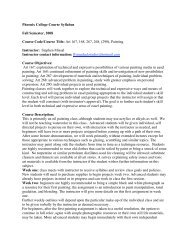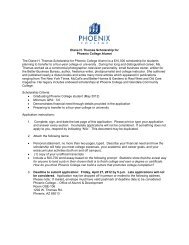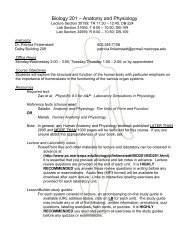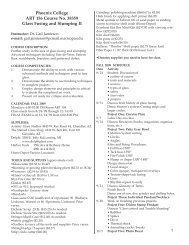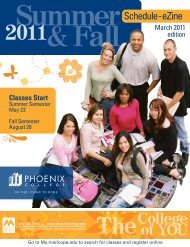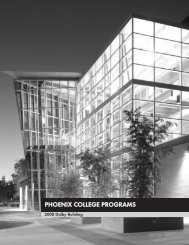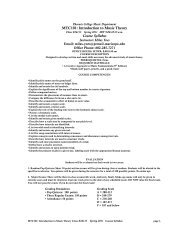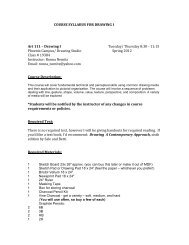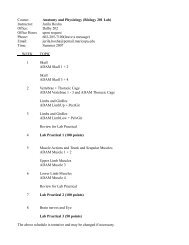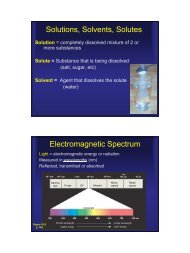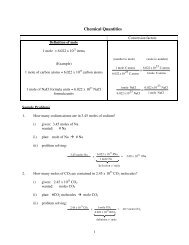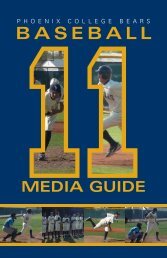Phoenix College Catalog 2009-10
Phoenix College Catalog 2009-10
Phoenix College Catalog 2009-10
You also want an ePaper? Increase the reach of your titles
YUMPU automatically turns print PDFs into web optimized ePapers that Google loves.
80 | <strong>Phoenix</strong> <strong>College</strong> <strong>2009</strong>–20<strong>10</strong> CATALOG<br />
MCCCD Degress<br />
B.<br />
courses above Calculus, and/or Science courses from:<br />
Astronomy, Biology, Botany, Chemistry, Environmental<br />
Science, Geology, Physical Geography, Physics, Zoology.<br />
Awareness Areas:<br />
Students must satisfy two Awareness areas: Cultural Diversity<br />
in the United States [C] and either Global Awareness [G] or<br />
Historical Awareness [H]. However, it is not necessary for<br />
students to exceed thirty-five to thirty-eight semester credits<br />
to complete any of the three MCCCD AGECs because courses<br />
can satisfy a Core area and one or two Awareness areas<br />
simultaneously. Therefore, no additional semester credits are<br />
required to satisfy the two Awareness areas.<br />
1. Cultural Diversity in the United States [C]<br />
AND<br />
2. Global Awareness [G]<br />
OR<br />
3. Historical Awareness [H]<br />
AGEC Area Requirements Descriptions/Definitions<br />
CORE AREAS<br />
First-Year Composition (FYC)<br />
Courses must be completed with a grade of “C” or better in the<br />
First-Year Composition Core area. Courses must emphasize skills<br />
necessary for college-level learning and writing skills.<br />
Literacy and Critical Inquiry [L]<br />
Courses must be completed with a grade of “C” or better in the<br />
Literacy and Critical Inquiry Core area. In the [L] course, typically at<br />
the sophomore level, students gather, interpret, and evaluate<br />
evidence and express their findings in writing or speech. This<br />
course includes a series of graded written or spoken formal<br />
assignments. For AGEC S, students will select a course that<br />
satisfies both Literacy and Social & Behavioral Sciences or Literacy<br />
and Humanities and Fine Arts requirements simultaneously.<br />
Literacy is defined broadly as communicative competence in written<br />
and oral discourse; critical inquiry is defined as the gathering,<br />
interpreting, and evaluating of evidence. Building on the proficiency<br />
attained in traditional First-Year Composition courses, the Literacy<br />
and Critical Inquiry requirement helps students sustain and extend<br />
their ability to reason critically and communicate clearly through<br />
language.<br />
Mathematical Studies<br />
Courses must be completed with a grade of “C” or better in the<br />
Mathematical Studies Core Area. One course must be selected<br />
from Mathematics [MA]. In AGEC A and AGEC B, a second course<br />
must be selected from Computer/Statistics/Quantitative<br />
Applications [CS].<br />
The Mathematical Studies requirement is intended to ensure that<br />
students have skill in basic mathematics, can use mathematical<br />
analysis in their chosen fields, and can understand how computers<br />
make mathematical analysis more powerful and efficient.<br />
First, the acquisition of essential skill in basic mathematics requires<br />
the student to complete a course in college algebra or to<br />
demonstrate a higher level of skill by completing a course for which<br />
college algebra is a prerequisite.<br />
Second, the real-world application of mathematical reasoning<br />
requires the student to take a course in statistics or the use of<br />
quantitative analysis to solve problems of substance.<br />
Third, the use of the computer to assist in serious analytical work is<br />
required. Computers are widely used to study the implications of<br />
social decisions or to model physical systems.<br />
Mathematics [MA] AGEC A<br />
The AGEC A Mathematics Core area requires a course in<br />
college mathematics, college algebra, pre-calculus, or any<br />
other mathematics course for which college algebra is a<br />
prerequisite.<br />
Mathematics [MA] AGEC B<br />
The AGEC B Mathematics Core area requires a course in<br />
Brief Calculus or a higher level mathematics course.<br />
Mathematics [MA] AGEC S<br />
The AGEC S Mathematics Core area requires the first<br />
course in the calculus sequence or any mathematics course<br />
for which that course is a prerequisite. MAT251 is required if<br />
transferring to a Life Sciences degree at Arizona State<br />
University (ASU).<br />
Computer/Statistics/Quantitative Applications [CS]<br />
AGEC A and B [CS] option requires: courses that emphasize the use<br />
of statistics or other mathematical methods in the interpretation of<br />
data and in describing and understanding quantitative relationships,<br />
courses that involve the use of computer programming languages<br />
or software in the development of skills in analytical thinking. AGEC<br />
B specifies CIS<strong>10</strong>5 as the course that meets the [CS] requirement.<br />
Humanities and Fine Arts [HU]<br />
Courses must be completed with a grade of “C” or better in the<br />
Humanities and Fine Arts Core area. Students are encouraged to<br />
choose coursework from more than one discipline. The Humanities<br />
and Fine Arts Core area enables students to broaden and deepen<br />
their consideration of basic human values and their interpretation of<br />
the experiences of human beings.<br />
The humanities are concerned with questions of human existence<br />
and the universality of human life, questions of meaning and the<br />
nature of thinking and knowing, and questions of moral, aesthetic,<br />
and other human values. The humanities investigate these<br />
questions in both the present and the past and make use of<br />
philosophy, foreign languages, linguistics and communications<br />
studies, religious studies, literature, and fine arts.<br />
The fine arts constitute the artist's creative deliberation about<br />
reality, meaning, knowledge, and values.<br />
Social and Behavioral Sciences [SB]<br />
Courses must be completed with a grade of “C” or better in the<br />
Social and Behavioral Sciences Core area. Students are encouraged<br />
to choose course work from more than one discipline.<br />
The Social and Behavioral Sciences Core area provides scientific<br />
methods of inquiry and empirical knowledge about human behavior,<br />
both within society and within individuals. The forms of study may<br />
be cultural, economic, geographic, historical, linguistic, political,<br />
psychological, or social. The courses in this area address the<br />
challenge of understanding the diverse natures of individuals and<br />
cultural groups who live together in a world of diminishing<br />
economic, linguistic, military, political, and social distance.<br />
Natural Sciences [SQ/SG]<br />
Courses must be completed with a grade of “C” or better in the<br />
Natural Sciences Core area.<br />
Courses in the Natural Sciences Core area help the student to<br />
develop an appreciation of the scope and limitations of scientific<br />
capability to contribute to the quality of society. This Core area<br />
emphasizes knowledge of methods of scientific inquiry and mastery<br />
of basic scientific principles and concepts, in particular those that<br />
relate to matter and energy in living and non-living systems.<br />
Firsthand exposure to scientific phenomena in the laboratory is<br />
important in developing and understanding the concepts, principles,<br />
and vocabulary of science. At least one of the two laboratory<br />
courses required in the Natural Sciences Core area must include an<br />
introduction to the fundamental behavior of matter and energy in<br />
physical or biological systems.



